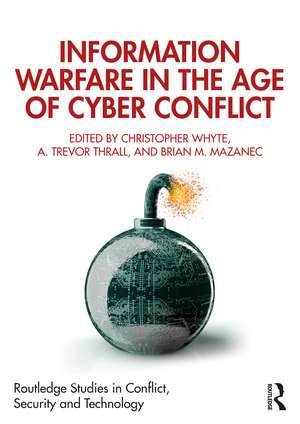Information Warfare in the Age of Cyber Conflict: Routledge Studies in Conflict, Security and Technology
Editat de Christopher Whyte, A. Trevor Thrall, Brian M. Mazanecen Limba Engleză Paperback – 29 iul 2020
This book examines the shape, sources and dangers of information warfare (IW) as it pertains to military, diplomatic and civilian stakeholders.
Cyber warfare and information warfare are different beasts. Both concern information, but where the former does so exclusively in its digitized and operationalized form, the latter does so in a much broader sense: with IW, information itself is the weapon. The present work aims to help scholars, analysts, and policymakers understand information warfare within the context of cyber conflict. Specifically, the chapters in the volume address the shape of influence campaigns waged across digital infrastructure and in the psychology of democratic populations in recent years by belligerent state actors, from the Russian Federation to the Islamic Republic of Iran. In marshalling evidence on the shape and evolution of information warfare as a broad-scoped phenomenon aimed at societies writ large, the authors in this book present timely empirical investigations into the global landscape of influence operations, legal and strategic analyses of their role in international politics, and insightful examinations of the potential for democratic process to overcome pervasive foreign manipulation.
This book will be of much interest to students of cyber-security, national security, strategic studies, defence studies and International Relations in general.
| Toate formatele și edițiile | Preț | Express |
|---|---|---|
| Paperback (1) | 302.25 lei 6-8 săpt. | |
| Taylor & Francis – 29 iul 2020 | 302.25 lei 6-8 săpt. | |
| Hardback (1) | 1059.80 lei 6-8 săpt. | |
| Taylor & Francis – 29 iul 2020 | 1059.80 lei 6-8 săpt. |
Din seria Routledge Studies in Conflict, Security and Technology
-
 Preț: 310.85 lei
Preț: 310.85 lei - 20%
 Preț: 259.98 lei
Preț: 259.98 lei -
 Preț: 311.41 lei
Preț: 311.41 lei -
 Preț: 326.49 lei
Preț: 326.49 lei -
 Preț: 310.85 lei
Preț: 310.85 lei -
 Preț: 311.59 lei
Preț: 311.59 lei -
 Preț: 385.54 lei
Preț: 385.54 lei - 13%
 Preț: 309.02 lei
Preț: 309.02 lei -
 Preț: 389.38 lei
Preț: 389.38 lei - 18%
 Preț: 1162.84 lei
Preț: 1162.84 lei -
 Preț: 462.60 lei
Preț: 462.60 lei -
 Preț: 469.34 lei
Preț: 469.34 lei - 31%
 Preț: 262.89 lei
Preț: 262.89 lei -
 Preț: 383.63 lei
Preț: 383.63 lei -
 Preț: 431.53 lei
Preț: 431.53 lei -
 Preț: 384.09 lei
Preț: 384.09 lei -
 Preț: 386.77 lei
Preț: 386.77 lei - 20%
 Preț: 303.08 lei
Preț: 303.08 lei -
 Preț: 311.41 lei
Preț: 311.41 lei - 18%
 Preț: 1003.30 lei
Preț: 1003.30 lei - 18%
 Preț: 1004.06 lei
Preț: 1004.06 lei - 18%
 Preț: 1002.63 lei
Preț: 1002.63 lei - 18%
 Preț: 999.34 lei
Preț: 999.34 lei - 18%
 Preț: 1054.58 lei
Preț: 1054.58 lei
Preț: 302.25 lei
Nou
57.85€ • 60.23$ • 48.89£
Carte tipărită la comandă
Livrare economică 07-21 martie
Specificații
ISBN-10: 1138600938
Pagini: 270
Ilustrații: 6 Tables, black and white
Dimensiuni: 174 x 246 x 17 mm
Greutate: 0.3 kg
Ediția:1
Editura: Taylor & Francis
Colecția Routledge
Seria Routledge Studies in Conflict, Security and Technology
Locul publicării:Oxford, United Kingdom
Public țintă
Postgraduate, Professional, and UndergraduateCuprins
Notă biografică
A. Trevor Thrall is Associate Professor in the Schar School of Policy and Government at George Mason University, USA, and a Senior Fellow at the Cato Institute, USA.
Brian M. Mazanec is a researcher of cyber conflict, strategic warfare, and intelligence and teaches in the Department of Defense and Strategic Studies at Missouri State University, USA, and in the Schar School of Policy and Government at George Mason University, USA.
Descriere
This book examines the shape, sources and dangers of information warfare (IW) as it pertains to military, diplomatic and civilian stakeholders.
Cyber warfare and information warfare are different beasts. Both concern information, but where the former does so exclusively in its digitized and operationalized form, the latter does so in a much broader sense: with IW, information itself is the weapon. The present work aims to help scholars, analysts, and policymakers understand information warfare within the context of cyber conflict. Specifically, the chapters in the volume address the shape of influence campaigns waged across digital infrastructure and in the psychology of democratic populations in recent years by belligerent state actors, from the Russian Federation to the Islamic Republic of Iran. In marshalling evidence on the shape and evolution of information warfare as a broad-scoped phenomenon aimed at societies writ large, the authors in this book present timely empirical investigations into the global landscape of influence operations, legal and strategic analyses of their role in international politics, and insightful examinations of the potential for democratic process to overcome pervasive foreign manipulation.
This book will be of much interest to students of cyber-security, national security, strategic studies, defence studies and International Relations in general.
